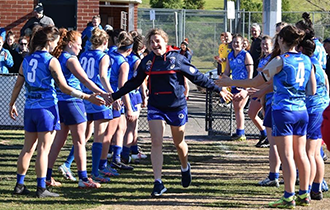
By Andrea Phillips
November 2020
WHILE COVID-19 related restrictions prevented face-to-face talks this year, an innovative online learning program from Special Olympics Australia shared proven approaches to tackling barriers that put people with autism off sport.
The six-part webinar series titled, Autism Inclusion in Sport, Recreation and Physical Education attracted 2,129 registrations. A third of participants were teachers and a quarter were sports coaches, with the most watched webinar being Inclusive Practice for Physical Education Teachers and Schools.
Nicole Rinehart, Professor of Clinical Psychology at Deakin University, Australia and one of the webinar presenters, says it was “incredibly exciting” to see this response, especially from physical education teachers wanting to learn how to practically support children with autism in school sport.
Sport is critical for all children’s physical and social development, Rinehart says, but sports at school can be one of the biggest challenges for young people with autism.
“They sit behind multiple invisible barriers, including communication and motor developmental issues.”
– Nicole Rinehart, Professor of Clinical Psychology at Deakin University
Of the 205,200 Australians with autism, 83 per cent are under 25 and 68 per cent have a profound or severe core activity limitation. Local data also shows that 72 per cent of people with a disability do not do enough physical activity for their age.
Teachers can see there is a problem, and they want to help, but previously they haven’t had the strategies, Rinehart says.
To address this, the webinars brought together presenters comprising people with lived experience of autism, teachers experienced in supporting young people with autism, researchers, and inclusive sports program deliverers.
Sarah Wheadon, the Project Specialist at Special Olympics Australia who led the webinar series project, says participants valued the opportunity to connect with people with lived experience of autism, one of whom was Elise Muller.
Muller, an Indigenous Victorian Football League Women’s athlete living with autism, generated the most interaction during the live webinars.

Hearing from Muller helped to demystify the condition for webinar participants. She showed how teachers and coaches can adapt their practices to focus on what children with autism can do and enable them to use their strengths.
Inclusion doesn’t mean everyone doing the same thing, Muller explains. It involves adapting the environment so that everyone is included, not forcing a person with disability to adapt to the environment.
When a child with autism is not included, Rinehart says, it is because of the structures and systems in place and not because of the abilities of the child.
“The question is not, ‘how do we support a child with autism’, but ‘how do we make our school fit for all children, regardless of their ability?’”
For teachers seeking answers, the volume of available information can be confusing to navigate, so Rinehart says it is important to condense best practice information into simple strategies that teachers can use to communicate with young people and parents.
Through the webinars, Rinehart says, “We’ve been able to give teachers a profile of young people with autism and their strengths, and feasible strategies to implement.”
The webinars remain freely accessible on Special Olympics Australia’s e-learning platform, SOA Learn, for anyone wanting to be more effective at including people with autism in sport.
Click here to view our 2020 Webinar Series infographic.
A version of this article was first published on sportanddev.org as part of celebrations for 2020 International Day of People with Disability.
Special Olympics Australia strives to ensure that everyone living with an intellectual disability can participate in sport. We provide: